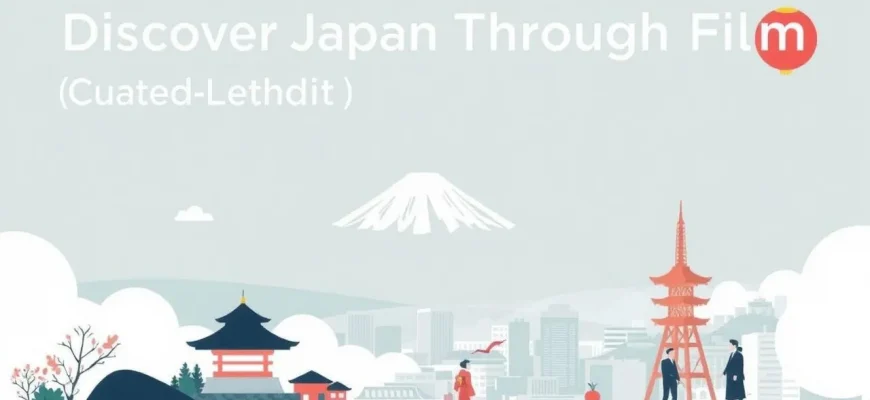Japan, with its unique blend of ancient traditions and cutting-edge modernity, has long fascinated filmmakers and audiences alike. This curated collection of films not only showcases the diverse landscapes and cultural nuances of Japan but also delves into its complex history, societal norms, and the human spirit. Whether you're a cinephile or a Japanophile, these films offer a window into the soul of this enigmatic country, each with its own storytelling flair and visual splendor.

Rashomon (1950)
Description: This groundbreaking film by Akira Kurosawa explores the subjectivity of truth through multiple conflicting testimonies about a crime, set against the backdrop of a decaying gate in Kyoto.
Fact: "Rashomon" won the Golden Lion at the Venice Film Festival, marking a significant moment for Japanese cinema on the world stage. The film's narrative structure has influenced countless works.
 Watch Now
Watch Now 
Tokyo Story (1953)
Description: A masterpiece by Yasujirō Ozu, this film examines the generational gap and the changing family dynamics in post-war Japan, offering a timeless reflection on human relationships.
Fact: Ozu's minimalist style, with low camera angles and static shots, has influenced countless filmmakers. The film was remade in 2013 as "Tokyo Family."
 Watch Now
Watch Now 
The Hidden Fortress (1958)
Description: Akira Kurosawa's adventure film, which inspired George Lucas for "Star Wars," follows two peasants who unwittingly become involved in a princess's escape from a warlord, showcasing Japan's feudal era.
Fact: The film was one of the first to use the "widescreen" format in Japan. It was also one of the first Japanese films to be released with English subtitles.
 Watch Now
Watch Now 
Spirited Away (2001)
Description: Hayao Miyazaki's animated masterpiece transports viewers to a magical world where a young girl must navigate a bathhouse for spirits, reflecting on themes of growing up, identity, and the clash between tradition and modernity in Japan.
Fact: "Spirited Away" became the first non-English-language film to win the Academy Award for Best Animated Feature. The film was inspired by Miyazaki's own childhood experiences.
 Watch Now
Watch Now 
The Last Samurai (2003)
Description: This epic drama follows an American military officer who becomes embroiled in the Satsuma Rebellion, offering a Western perspective on the samurai's way of life and the clash between tradition and modernization in late 19th-century Japan.
Fact: Tom Cruise underwent extensive training in samurai sword fighting for his role. The film was shot on location in Japan, including at the famous Himeji Castle.
 Watch Now
Watch Now 
Lost in Translation (2003)
Description: A poignant exploration of loneliness and connection, this film captures the essence of Tokyo's vibrant yet isolating urban life through the eyes of two lost souls finding solace in each other.
Fact: The film was shot guerrilla-style in Tokyo, with Sofia Coppola often directing from a van to capture the city's authentic atmosphere. Bill Murray improvised many of his lines.
 Watch Now
Watch Now 
Memoirs of a Geisha (2005)
Description: This visually stunning adaptation of Arthur Golden's novel provides an intimate look into the world of geishas, exploring themes of beauty, sacrifice, and the intricate art of Japanese entertainment.
Fact: The film was shot in California, but the production team recreated Kyoto's Gion district with meticulous detail. The actresses underwent extensive training in traditional Japanese arts.
 Watch Now
Watch Now 
Departures (2008)
Description: This Oscar-winning film delves into the life of a cellist who becomes a "nokanshi," a traditional Japanese ritual specialist, highlighting the beauty and dignity in death and the art of farewell.
Fact: The film's director, Yōjirō Takita, was inspired by a documentary about the profession. The film's title in Japanese, "Okuribito," translates to "those who send off."
 Watch Now
Watch Now 
Tampopo (1985)
Description: A quirky and comedic take on the Western genre, this film centers around a quest to create the perfect ramen, offering a satirical look at Japanese food culture and societal norms.
Fact: The film's director, Jūzō Itami, was known for his satirical works. "Tampopo" was a commercial success in Japan and has since gained a cult following worldwide.
 30 Days Free
30 Days Free 
The Twilight Samurai (2002)
Description: This poignant drama set in the late Edo period follows a low-ranking samurai who must navigate his duty, family, and personal honor in a changing world, offering a nuanced portrayal of samurai life.
Fact: The film won the Japanese Academy Award for Best Picture. It was also Japan's submission for the Academy Award for Best Foreign Language Film.
 30 Days Free
30 Days Free 








